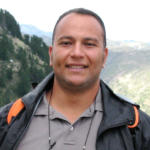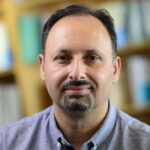Salah Mehdi, University Professor, is the new head of Analysis and Theory of Numbers team. Karim Ramdani, Director of Research at Inria, is in charge of Partial Differential Equations team. They took up their positions on June 1st. We interviewed them.


1. What are the research axes and themes of your team?
Karim: Our work in the “Partial Derivative Equations and Applications” team covers a wide spectrum from theoretical questions (existence, regularity, spectral theory, controllability, stability,…) to more applied aspects (modeling, scientific computation,…) in the fields of physics or biology. We are structured in 6 themes, having a certain number of overlaps:
– Optimization of forms and calculus of variations
– Control theory and inverse problems
– Fluid mechanics and fluid-structure interaction
– PDE analysis & spectral theory
– Diffusion reaction equations & mathematics related to biology
– Numerical simulation and scientific computing
Salah: The main research axes of the Analysis and Number Theory team are non-commutative harmonic analysis, non-commutative geometry, physical mathematics and number theory. More precisely, the problems of the team cover a very broad spectrum : representation theory of Lie groups, harmonic analysis on homogeneous spaces, Jordan algebras, groupoids and their applications, K-theory of C*-algebras, index theory, geometric modeling motivated by Physics; (multi)symplectic geometry and singular foliations, distribution of primes, Riemann zeta and Dirichlet L-functions, friable integers, irrationality measures and approximations.
2. What are your plans for the team?
Karim: Learn to slow down. Do less but better. Reinforce the sense of teamwork. And remember that we have the right to make mistakes, to run into difficulties or to fail when we do research: permanent “excellence” is a deleterious fiction…
Salah: The Analysis and Theory of Numbers (ATN) team is one of the four teams of the IECL. It has about forty members, including ten doctoral students, and benefits from the administrative support of two assistants. It is the result of a fusion between very diverse themes and a subtle balance between the different sites of the IECL. My main objective is to turn this apparent complexity into a strength, to make ATN an example of a multi-site but united team, of a multi-thematic but balanced team, to ensure that ATN remains a dynamic team that produces quality research and collaborations and ensures a high level of doctoral training, a team whose members interact with each other in a trusting and friendly manner, a team that is involved in collective responsibilities and in the organization of scientific events
3. How do you see your new position?
Karim: Trying to listen to and accompany colleagues in their projects as best as possible.
Salah: This requires listening and regular dialogue, a deep reflection on the functioning of the team and its strategic choices that guarantee balance and respect for different sensibilities. It is not an easy task, but my role is to ensure that the team functions well, to listen and to propose solutions to the requests and questions of colleagues, PhD students and administrative assistants. There is inevitably a political aspect which consists in defending the interests of the team and its balance, in particular through recruitments, doctoral contracts and visiting professorships. It is also necessary to maintain and reinforce a conviviality that has been so lacking in recent times. I look forward to organizing a real team meeting around a real buffet to mark a new post-covid start, far from the screens and virtual discussions. I have to say that I was briefly in charge of the ATN team at the time of the merger of the Lorraine universities and the creation of the IECL, before becoming head of the mathematics department in Metz. I would like to take advantage of this interview to thank Camille Laurent-Gengoux who has brilliantly ensured the responsibility of the team during all these years.
4. What are the current issues and questions for your team?
Karim: Trying to get back to a proper team life after the never-ending Covid episode…
Salah: The questions and issues of the moment for the ATN team are of different natures. First, there is the drafting of the balance sheet of the team’s activities between 2016 and 2020, with the thorny selection and synthesis of the elements deemed the most significant and representative. Then, with the new period starting, it is necessary to discuss and decide on the scientific policy of the team in the years to come, in particular the priorities in the future recruitments, the recurrent or not scientific activities, the training and the future of our PhD students in this period of shortage of posts. One challenge is to find a mode of consultation and discussion within the team that allows for more thoughtful and consensual choices, respectful of the team project and of the thematic and geographic balances specific to ATN. We hope that the health situation will improve very quickly, so that we can meet in person, share moments of conviviality and continue our activities more or less normally.

